The Rise of AI in White-Collar Jobs
AI in white-collar jobs
The Rise of AI in White-Collar Jobs
How AI is Redefining White-Collar Professions
As we peer over the edge one of the most profound technological shifts in history, one thing glaringly stands out. The rise of artificial intelligence (AI) is no longer confined to factory floors or automated warehouses. Instead, AI has begun to penetrate deeply into white-collar professions—those jobs traditionally associated with intellectual work, decision-making, and human expertise. Whether in the boardroom, law, finance, healthcare, or consulting, AI is reshaping professional services, automating cognitive tasks, and redefining the nature of work.
- In his groundbreaking book A Thousand Brains, Jeff Hawkins explains how machine intelligence, while structurally different from human intelligence, is poised to have an enormous impact on human labor, particularly in roles that have long been considered safe from automation. Hawkins’ “Thousand Brains” theory suggests that AI’s power comes from its ability to operate parallel models, allowing it to tackle complex tasks without human biases or limitations. This insight gives us a critical framework to understand how AI will transform the future of white-collar work.
 AI and Professional Services: Transforming the Landscape
AI and Professional Services: Transforming the Landscape
Today, right now, we teeter on the precipice of further disruption. Artificial intelligence is no longer confined to routine automation. It is making its way into the boardrooms, hospitals, law firms, and financial institutions, reshaping how complex decision-making is handled. AI is already revolutionizing legal research, financial analysis, and medical diagnostics, reducing the workload for professionals and increasing accuracy in routine tasks. These changes, which are increasingly prevalent, showcase the inevitability of AI transforming every aspect of professional services.
AI in Law and Healthcare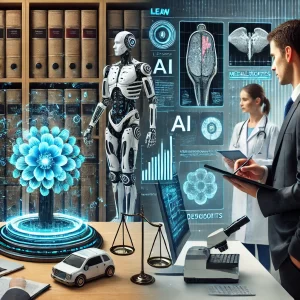
Take law, for example: AI-driven legal research tools are not only scanning thousands of legal precedents within seconds but also drafting first versions of contracts and briefs. In finance, AI is making decisions about investments, risk assessments, and fraud detection faster and with fewer errors than human experts.
The healthcare industry is seeing AI-assisted diagnostic tools outperform doctors in areas like imaging and predictive analytics. This shift isn’t just hypothetical; it’s happening now, and the effects are only beginning to ripple through these sectors .
A Thousand Brains provides an invaluable perspective here: machine intelligence, unlike human intelligence, is not subject to the same limitations of speed, focus, or data processing. Hawkins explains that AI can maintain multiple models of information at once, processing complex and data-heavy tasks with efficiency beyond human capacity. In professional services, this means that jobs involving vast amounts of data processing—like those in law, finance, and healthcare—are particularly vulnerable to automation.
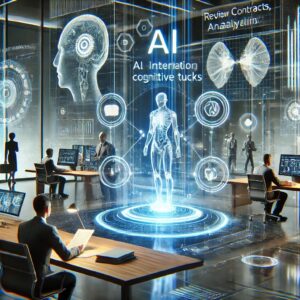 Automation of Cognitive Tasks: AI Takes the Lead
Automation of Cognitive Tasks: AI Takes the Lead
While previous industrial revolutions automated physical labor, AI is now automating cognitive tasks—activities once thought too complex for machines. According to Hawkins’ thesis in A Thousand Brains, machine intelligence doesn’t mimic human thought but creates a new form of problem-solving, free from emotional, social, or survival instincts that shape human decision-making.
AI in White-Collar Fields: Real-World Applications
In fields like law, finance, and healthcare, AI is already transforming white-collar tasks. For example, in law, AI systems are handling contract review, in finance, they are executing market analysis, and in healthcare, AI interprets medical imaging with higher precision than many human experts.
Hawkins argues that machine intelligence has a profound advantage here: it can process parallel streams of data without cognitive fatigue or the biases that influence human decision-making. Imagine an AI in a financial institution assessing global market conditions in real-time, synthesizing data from every major stock market to make decisions faster and more accurately than any human.
The Cognitive Advantage: Precision in High-Stakes Fields
By removing human cognitive limitations, AI enables faster and more precise decisions in fields like corporate strategy, management, and consulting, where high-stakes decisions demand both speed and accuracy. While AI may not fully replace human experts, it will shift their roles from hands-on tasks to oversight and decision validation, significantly altering professional dynamics.
Parallel Insights from Earlier Blogs
This concept mirrors themes from our previous blog, “The Automation Scenarios: Predicting the Impact”, where we explored the varied timelines for AI and automation adoption across industries. Here, cognitive tasks are at the forefront of this shift, and the speed of adoption depends largely on how quickly businesses embrace and integrate these technologies into their workflows.
The Human-AI Collaboration: Augmenting, Not Replacing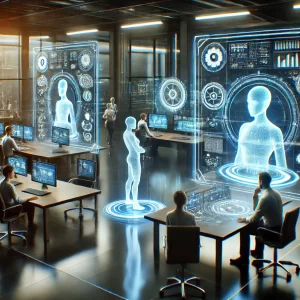
Despite the rapid rise of AI, not every job in white-collar professions will be displaced. Instead, a more likely scenario is human-AI collaboration. Hawkins suggests that while AI will take over many routine cognitive tasks, it will also work alongside humans, enhancing our ability to make creative and strategic decisions. In consulting, medicine, law, and finance, AI can augment human decision-making by providing data-driven insights, while humans focus on ethics, creativity, and emotional intelligence—areas where machines still lag behind.
Humans Still Have a Role to Play
Consider the field of medicine: While AI might handle diagnostics by scanning patient data and medical images, human doctors will still play a vital role in interpreting these results, making complex treatment decisions, and providing emotional care to patients. Similarly, in law, AI may draft contracts, but human lawyers will still need to negotiate deals, interpret nuances in client needs, and apply ethical judgment.
As we discussed in “The Socioeconomic Impact of Workforce Displacement”, the rise of AI doesn’t have to lead to widespread unemployment. Instead, it presents an opportunity for workers to reskill and adapt, shifting into roles that are better suited to the human brain’s strengths—like leadership, innovation, and personalized client services.
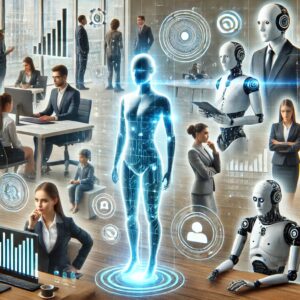 Job Categories Most Affected
Job Categories Most Affected
While the rise of AI brings the promise of increased efficiency and precision, it also raises questions about which white-collar job categories are most at risk. According to Hawkins, jobs that rely heavily on data analysis, repetitive decision-making, or routine cognitive work will be the first to undergo automation. This includes roles like accountants, data analysts, financial planners, and legal researchers. AI will be able to perform these tasks faster and with fewer errors, allowing companies to reduce their human workforce in these areas.
On the flip side, jobs that require creativity, emotional intelligence, and strategic thinking—such as marketing, consulting, and leadership positions—are less likely to be automated in the near future. However, even these roles will be transformed as humans collaborate with AI systems to enhance their decision-making processes.
The Future of Home-Based Entrepreneurship: Network Marketing Augmented by Machine Intelligence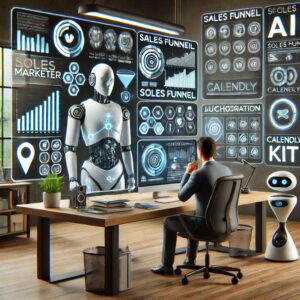
As AI continues to transform traditional white-collar jobs, a unique opportunity emerges for entrepreneurs looking to capitalize on this disruption—particularly in the realm of digitally driven, AI-augmented network marketing. The future of work won’t just be about which jobs get automated, but also how entrepreneurs can leverage AI to scale their businesses efficiently and effectively. For home-based entrepreneurs, network marketing powered by machine intelligence offers the perfect blend of personal connection, automation, and scalability.
Why Network Marketing is Ideal for the AI Age
1. AI-Enhanced Sales Funnels
One of the key challenges for network marketers is attracting a steady stream of highly qualified prospects. This is empowered by building and maintaining effective sales funnels that guide prospects through the customer journey—from initial contact to conversion. With AI-powered platforms like ClickFunnels, entrepreneurs can automate this process. AI tools analyze customer behaviors, preferences, and engagement patterns to optimize sales funnels in real-time, ensuring higher conversion rates with minimal manual effort.
ClickFunnels, when integrated with AI, allows for:
•Automated lead segmentation: AI can categorize leads based on behavior and demographics, ensuring personalized messaging that resonates with individual prospects.
•Behavioral triggers: AI-driven tools monitor user interactions and trigger automated emails or content, ensuring that prospects receive timely, relevant follow-ups.
•Optimization insights: Machine learning can track which parts of the sales funnel perform best, suggesting real-time adjustments for greater conversion.
2. Seamless Scheduling with AI Integration
Efficient scheduling and follow-ups are crucial in network marketing, and this is where AI-driven tools like Calendly come into play. By integrating ClickFunnels with Calendly, network marketers can offer prospects seamless appointment scheduling, ensuring that leads have the opportunity to connect directly with the marketer at optimal times.
•Automated scheduling: Calendly automatically syncs with your calendar, suggesting open time slots based on both your availability and customer preferences.
•Smart reminders: Integrated AI tools send automated reminders to both the marketer and the prospect, reducing no-shows and optimizing meeting efficiency.
3. Automated Communication and Nurture Sequences with KiT
Maintaining ongoing relationships and nurturing leads into customers is the backbone of network marketing. KiT (Keep in Touch) is an AI-powered communication tool that automates these nurturing sequences, ensuring that every lead is followed up with at the right time and with the right message. Through integrations with sales funnels, network marketers can automate drip campaigns, newsletters, and personalized messages, all without needing to manually track each contact.
Key benefits of KiT include:
•AI-optimized email campaigns: AI tracks user engagement, such as email opens and clicks, to deliver optimized communication.
•Tailored messages: Based on customer behavior and preferences, AI automatically personalizes messages, ensuring that prospects feel understood and valued.
•Lead scoring: KiT can score leads based on engagement, helping network marketers prioritize their efforts toward the highest-value prospects.
4. Leveraging Zoom for Presentations and Team Building
While much of network marketing can be automated, the human touch remains crucial—particularly in building trust and rapport. Platforms like Zoom, integrated with AI tools, allow entrepreneurs to host real-time video presentations, webinars, and team-building events. What’s more, AI-powered transcription services automatically generate summaries of these meetings, ensuring no key points are lost.
•Webinars on autopilot: AI can analyze audience engagement during webinars and suggest improvements to presentation flow, ensuring that marketers are constantly improving their approach.
•Real-time interaction tracking: AI can track audience behavior during live presentations, such as attentiveness and questions asked, providing valuable insights for follow-ups.
5. Utilizing Facebook, YouTube, and Podcasting for AI-Powered Advertising
In the digital age, advertising is crucial for scaling a network marketing business. AI integration with social platforms like Facebook, YouTube, and podcasting helps automate ad targeting, ensuring your content reaches the right audience.
•Facebook Ads with AI: Facebook’s AI-driven advertising platform allows marketers to create highly targeted ad campaigns. AI optimizes ad placement and targeting based on user behaviors, interests, and engagement patterns.
•YouTube’s AI recommendations: AI-enhanced YouTube ads target users who are most likely to be interested in your product, based on their watch history and behavior.
•Podcast automation: AI tools can help network marketers script, record, and distribute podcasts, all while tracking listener engagement and feedback. AI-powered podcast hosting platforms can automatically suggest topics that are trending and relevant to your audience.
The Human Touch in the Digital Age
While AI provides the tools to automate many of the time-consuming aspects of network marketing, it’s important to remember that human connection remains at the core of this business model. Network marketing is built on relationships, trust, and emotional intelligence—qualities that, for now, AI cannot replicate.
By leveraging AI-powered tools to handle repetitive tasks, home-based entrepreneurs are free to focus on what they do best: building relationships, coaching team members, and nurturing personal connections. This combination of human empathy and machine efficiency is the ideal formula for success in the AI-driven future of work.
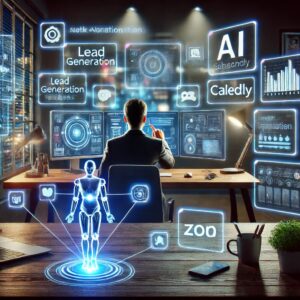 Now is the Time to Embrace AI-Augmented Network Marketing
Now is the Time to Embrace AI-Augmented Network Marketing
The convergence of AI and network marketing presents a rare opportunity for entrepreneurs to scale their businesses like never before. With AI tools handling the heavy lifting of lead generation, customer nurturing, and content creation, network marketers can focus on strategy, leadership, and relationship-building—areas that are not easily automated.
By mastering digital marketing skills and integrating AI-powered tools, home-based entrepreneurs can create businesses that are resilient, scalable, and future-proof. With automation taking care of the backend, these marketers can thrive in a rapidly evolving digital landscape, building a sustainable, long-term income stream.
This future is now—and those who seize the moment will find themselves at the forefront of a business model that’s built to withstand the challenges of AI-driven disruption while capitalizing on its opportunities.
Join Our Exclusive Facebook Group: Digital Marketing Secrets for Network Marketing Success
If you’re serious about mastering AI-augmented network marketing and building a home-based business that thrives in the digital age, now is the time to take action. The fusion of AI tools with digital marketing strategies is not just a passing trend—it’s the future of entrepreneurship. Whether it’s automating lead generation, streamlining customer engagement, or simplifying content creation, AI can help you focus on what matters most: relationship-building, leadership, and creating value for your network.
By joining our private Facebook group, Digital Marketing Secrets for Network Marketing Success, you’ll gain exclusive access to:
•Cutting-edge strategies for leveraging AI in network marketing
•Expert insights on scaling your business using AI-powered tools like ClickFunnels, Calendly, KiT, and Zoom
•Networking opportunities with like-minded entrepreneurs who are embracing the future of AI-driven marketing
Take the step to future-proof your business and become part of a community that’s dedicated to navigating the challenges and opportunities of this new era. Click [here] to join the conversation and start mastering the tools that will keep you ahead of the curve!
Conclusion: Preparing for the Inevitable Change
The rise of AI in white-collar professions is not a distant future—it’s unfolding right now. As A Thousand Brains illustrates, machine intelligence is not a mere extension of human capabilities, but a new form of intelligence altogether. As we continue down this path, the most successful professionals will be those who embrace human-AI collaboration, learn to work alongside AI, and develop the uniquely human skills that machines cannot replicate.
For those looking to navigate this evolving landscape, we recommend revisiting our earlier blogs to gain a deeper understanding of the broader context. Start with “The Dawn of Automation: A Historical Perspective” to understand how previous technological shifts reshaped work, then dive into “Mapping the Workforce of Tomorrow” for insights on the sectors most vulnerable to change.
In this rapidly changing world, those who adapt will thrive. Prepare yourself by developing new skills, focusing on creative and strategic thinking, and learning to collaborate with the AI systems that will define the future of work.
#AI, #Automation, #WhiteCollarJobs, #FutureOfWork, #ArtificialIntelligence, #DigitalTransformation, #NetworkMarketing, #Entrepreneurship, #HomeBusiness, #AIAugmented

John Rogers is a former Wall Street portfolio manager and served as CEO of Premium Enterprises and President of The Colorado Tire Recycling Center. He transitioned to digital marketing, founding WealthCreationMastermind.com to empower home-based entrepreneurs with cutting-edge strategies. Creator of the “Mastering the Art of Wealth Creation” online course, John has driven significant growth in network marketing, achieving the Blue Diamond rank and earning the title of Univera Associate of the Year in 2015. His expertise in leveraging technology for financial success transforms how entrepreneurs achieve their business goals.